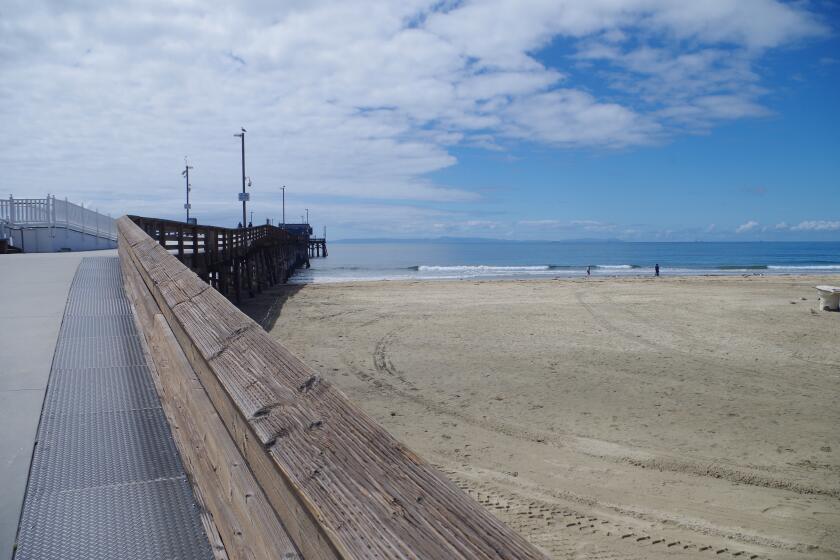JOSEPH N. BELL -- The Bell Curve
- Share via
I had just finished teaching a seminar at the UCI Academy for Lifelong
Learning when the John Noyes story broke. My seminar subject was “The
American News Media -- Why Kill the Messenger?”
I had a lively and outspoken group of participants who gave me a lot of
reasons for -- if not killing -- at least rapping the messenger sharply
on the side of the head.
Since one of their major criticisms was what they considered an
outrageous invasion of personal privacy by the press, I hate to think
where they would have gone with the Noyes affair. And I’m not sure how
stoutly I would have performed my seminar role as defender of the press
because I see more gray than black or white in the exposure of Noyes’
past problems.
I believe strongly, along with Tom Jefferson, that an unfettered,
aggressive press in this country has done more to protect our freedoms
and shape up our public officials than any other element in our society.
But I also believe that there has been a steadily growing intrusion into
the private affairs of people in public life by the press in recent
years.
Sometimes the intrusions have weighed directly on their public
performance. Sometimes they haven’t. And sometimes it’s hard to make a
distinction. Complicating the problem is the fact that we tend to approve
intrusions in the lives of people we don’t like and deplore them when the
victim thinks the way we do.
My own background in journalism has some bearing on these feelings. I
grew up with a president who suffered from a polio so crippling that he
couldn’t stand unaided. Yet -- and this is incredible to me now -- I
wasn’t aware of his infirmity, largely because it was never mentioned in
the press and he was never photographed with his braces showing.
President Warren Harding’s peccadilloes, Dwight Eisenhower’s relationship
with his female driver during World War II, FDR’s estrangement from his
wife and long affair with Lucy Mercer, even John Kennedy’s extramarital
adventures were not spread across the media at the time they happened --
partly out of ethical restraint and largely because they were deemed to
have little or no bearing on public performance.
I made more than a few similar choices in five decades as a working
journalist that probably would be regarded as foolishly sentimental
today.
Now the press almost universally goes for the jugular, a much tougher
place from which to weigh the two critical questions posed in the Noyes
affair: is the revelation of deeply disturbing events that took place in
Noyes’ life one to two decades ago in the public interest? Is it
justified because it raises serious questions about Noyes’ qualifications
for public office and his ability to perform those duties effectively?
Those questions seem almost quaint today, when anyone running for public
office in this country can be certain that his or her past is going to be
exhumed, whether or not it has anything to do with how well they can
perform their public duties. And the resultant judgments will too often
grow out of limited information, fear, hostility or an overpowering sense
of self-righteousness by those doing the judging.
The excessive nature of the Noyes case makes these ethical questions
easier to resolve. Alleged child abduction and falsifying a Social
Security card, both clearly suggested by documents in the case, can’t be
shrugged off in a public official, no matter how long ago they took place
and what extenuating circumstances might have existed.
Still -- despite the solid investigative reporting -- there is much we
don’t know, especially about his motives in this matter.
In this ethical dilemma, two other components that weigh heavily against
Noyes are betrayal and hypocrisy. Many of the people who supported Noyes
feel betrayed by his failure to deal honestly with his own past. And even
more seem to be angry at the hypocrisy implicit in his criticism of
colleagues for what he regarded as unethical behavior.
In light of his past, his credibility in taking ethical stands now would
seem to be close to zero -- which is not an effective place from which to
govern.
I realize that decisions have to be made and acted on in such matters,
and I’m glad I didn’t have to decide whether to publish the article in
this instance. I’m not at all sure I would have arrived at the same
place.
Although I understand that gray is an indulgence decision-makers finally
don’t enjoy, it is also a legitimate place from which others can usefully
evaluate the decision and its impact on the larger issues involved.
The Noyes case provides a test-tube model of the complexities that arise
in meeting the media’s enormous responsibility to weigh carefully the
public interest before upending the life of an individual and those close
to him or her.
And because few people have lived spotless lives, not the least of those
considerations is the impact such exposure will have in convincing good
candidates not to run for public office.
* JOSEPH N. BELL is a resident of Santa Ana Heights. His column usually
appears Thursdays.
All the latest on Orange County from Orange County.
Get our free TimesOC newsletter.
You may occasionally receive promotional content from the Daily Pilot.



